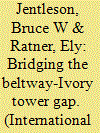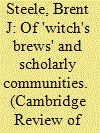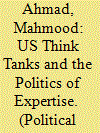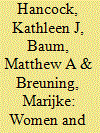| Srl | Item |
| 1 |
ID:
103247


|
|
|
|
|
| Publication |
2011.
|
| Summary/Abstract |
While some gap between the academic and policy worlds is inherent, it is neither necessary nor beneficial for the "Beltway-Ivory Tower" to be as wide as it is. Three principal factors explain the extent of the gap: academia's dominant organizational culture, which devalues policy relevance; increased role of think tanks as research transmission belts to the policy world; and limited interest of the policy community in academic research. The case for the value of greater policy relevance for the international relations scholarly community is based on the intellectual pluralism of bringing policy relevance in while not driving theory out, intellectual complementarity in the different relative strengths of scholars and policy professionals, and self-interest both in what individual scholars can learn and in being true to the mission of universities. We make three principal bridging the gap recommendations: increase disciplinary incentives for policy relevant scholarship, more programmatic and project-based connectivity, and more policy world experiential opportunities.
|
|
|
|
|
|
|
|
|
|
|
|
|
|
|
|
| 2 |
ID:
094555


|
|
|
|
|
| Publication |
2010.
|
| Summary/Abstract |
In a series of lectures in the early 1980s, Michel Foucault resurrected the Greek word for frankness or truth-telling-'parrhesia'-to investigate the inter-relationships and tensions that existed between freedom, truth-telling and political power. He concluded that in order for one to 'tell the truth' against a powerful superior, one needs the courage to oppose a community of which the parrhesiastes ('truth teller') is a member. This paper uses parrhesia to investigate the practice of the international relations (IR) scholar in speaking out against his or her scholarly community. Tony Smith's 2007 book Pact with the devil is used as an example of academic-intellectual parrhesia not only to illustrate the content of a potential form of parrhesia, but to demonstrate the challenges IR scholars who wish to practise academic parrhesia face in criticizing members of their academic community. Smith's critique of democratic peace theory specifically, and liberal IR theory more generally, is particularly noteworthy considering Smith's former position as a leading liberal proponent. The paper reviews, and then supplements and extends, Smith's critique of democratic peace theory.
|
|
|
|
|
|
|
|
|
|
|
|
|
|
|
|
| 3 |
ID:
084374


|
|
|
| 4 |
ID:
126713


|
|
|
|
|
| Publication |
2013.
|
| Summary/Abstract |
Why are women still relatively scarce in the international studies profession? Although women have entered careers in international studies in increasing numbers, they represent increasingly smaller percentages as they move from PhD student to full professor. Our survey investigates why this is so, focusing on the assistant professor years, which are crucial to succeeding in the profession. We found that there are significant differences in publication rates, as well as differences in research focus (traditional subjects vs. newer subfields) and methodologies (quantitative vs. qualitative). Further, women and men have different perceptions of official and unwritten expectations for research, and policies regarding faculty with children may affect how successful women are in moving up the ladder. Taken together, these findings suggest reasons for the continued "leakiness" of the career pipeline for women and some potential solutions.
|
|
|
|
|
|
|
|
|
|
|
|
|
|
|
|